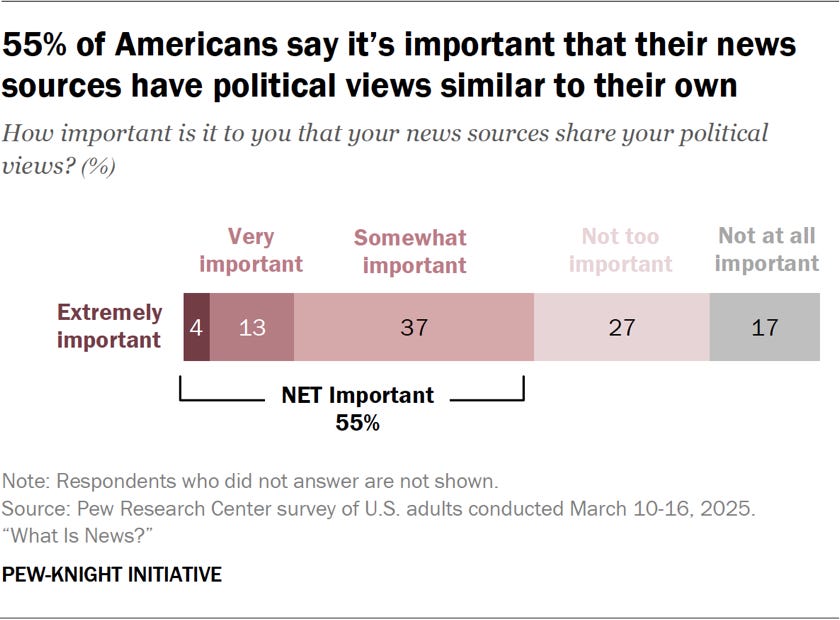Weekly Groundings are published every Friday to highlight the most interesting news, links, and writing I investigated during the past week. They are designed to ground your thinking in the midst of media overload and contribute to Handful of Earth’s broader framework. Please subscribe if you’d like to receive these posts directly in your inbox.
If you’re already subscribed and want to help the publication grow, consider sharing Handful of Earth with a friend.
“The Techno-Populist Convergence”
analyzes the growing “technopopulist fusion” for Compact: “[T]he truth is that the [populist] insurgents are now part of the furniture, and mostly about as immobile as that image suggests. When they are not already in government, they are His Majesty’s Loyal Opposition. But the issue isn’t simply that the political landscape has shifted: It is that the opposition between technocrats and populists is a phony one, and perhaps always was. The political reality of the current moment is, in fact, techno-populism: a synthesis of populism and technocracy that is no longer merely rhetorical and stylistic—the way politics is done—but increasingly also substantive. In other words, techno-populism is at the core of what politics is about.”He continues: “The contours of this emerging technopopulist landscape, though, may well be more visible in the periphery. It is in countries like Hungary, Turkey, and India where a leader-focused form of nationalist populism has been able to hegemonize the political field. In contrast to the North Atlantic, where populists have sought to speak for the ‘left behind,’ in the semi-periphery of the globe, figures like Modi or Bolsonaro have also drawn support from the traditional middle classes. This configures their politics less towards inclusion of the unrepresented, and more towards exclusion of the poor, the foreign, and so on. This may be indicative of where Trump is heading, too—the Republicans won’t become a ‘party of workers,’ but he can helm a cross-class coalition drawing themes from across the spectrum.”
Hochuli concludes: “The result is that the backlash against globalism represented by national populism will not result in a reconfiguration of the global order….What is happening is that liberal technocrats are slowly abandoning an exhausted cultural progressivism that has served as the main means of legitimation over the past decades, while national populists are entering government in a growing number of countries … and conforming, not transforming.”
“Josh Hawley: Don’t Cut Medicaid”
Speaking of populists, Republican Senator Josh Hawley writes an op-ed for The New York Times in defense of Medicaid: “Mr. Trump has promised working-class tax cuts and protection for working-class social insurance, such as Medicaid. But now a noisy contingent of corporatist Republicans—call it the party’s Wall Street wing—is urging Congress to ignore all that and get back to the old-time religion: corporate giveaways, preferences for capital and deep cuts to social insurance. This wing of the party wants Republicans to build our big, beautiful bill around slashing health insurance for the working poor. But that argument is both morally wrong and politically suicidal.”
“One of my constituents, a married mother of five, contacted me to explain why Medicaid is vital to her 8-year-old daughter, who depends on a feeding tube to survive. Formula, pump rentals, feeding extensions and other treatments cost $1,500 a month; prescriptions nearly double that cost. These expenses aren’t covered by private insurance. The mother wrote to me, ‘Without Medicaid, we would lose everything—our home, our vehicles and, eventually, our daughter.’”
Hawley writes: “Republicans need to open their eyes: Our voters support social insurance programs. More than that, our voters depend on those programs. And there’s a reason for this that Republicans would do well to ponder. Our economy is increasingly unfriendly to working people and their families. For the better part of 50 years, working wages have been flat in real terms. Working people cannot afford to marry when they want to, have the number of children they want to or raise those children as they want to. These days, they can barely afford to put a roof over their kids’ heads, to say nothing of health care…If Republicans want to be a working-class party—if we want to be a majority party—we must ignore calls to cut Medicaid and start delivering on America’s promise for America’s working people.”
“What Is News?”
Pew Research Center publishes an in-depth study of how Americans think about news: “[A]s people are exposed to more information from more sources than ever before and lines blur between entertainment, commentary and other types of content, these questions are not as straightforward as they once were. This unique study from the Pew-Knight Initiative explores the question: What is ‘news’ to Americans—and what isn’t?”
“The results of this study capture [the] changing dynamics of news consumption in the U.S. The journalists and editors we interviewed agree that in the digital age, the power to define news has largely shifted from media gatekeepers to the general public. And discussions with everyday Americans confirm the idea that its definition varies greatly from person to person, with each bringing their own mindset and approach to navigating a dizzying information environment.”
Among other findings, the study notes that Americans “say news should not be biased,” but 55% also believe that their news sources should align with their political views:
“In Defense of ‘Doing Your Own Research’”
In the midst of this “dizzying information environment,”
defends “doing your own research” for : “On April 29, HHS Secretary Robert F. Kennedy appeared on the Dr. Phil show to discuss his first 100 days in office. While many of his supporters celebrated the mention of geoengineering, the corporate media lambasted Kennedy for discussing so-called chemtrails, and, more specifically, for recommending the public ‘do their own research.’“‘We live in a democracy and part of the responsibility of being a parent is to do your own research,’ Kennedy told Dr. Phil's audience. ‘You research the baby stroller, you research the the foods that they're getting, and you need to research the medicines that they're taking as well.’ Immediately following this appearance, the corporate media went to work disparaging Kennedy for daring to suggest that parents take the time to be informed about their children's health choices, as opposed to blindly trusting their doctors or the recommendations of government agencies.”
Broze discusses one response to Kennedy that advocates for “better doctor-patient relationships” but “does not address the root cause of the problem—the people have lost faith in institutions which have been wrong more than once and are demonstrably overtaken by corporate influence. We've been told that fluoride is safe, vaccine damage is not real, and that Genetically Modified foods will save the planet. These three claims alone have been proven to be false.’
He also notes that “many people, including those who consider themselves ‘awake’ or ‘conscious,’ are simply looking to confirm their own biases. We're all capable and guilty of this at different times. It's something we have to fight against. Rather than confirming our current beliefs, we ought to be willing to directly challenge our strongly held opinions and confront our biases. How do we do this? You can start by reading and listening to opposing viewpoints. Yes, this means reading mainstream corporate media, or watching mainstream news reports which are based on research from government agencies and medical establishments. This also means being willing to read the studies which are referenced, and doing your best to understand the methods and the conclusions. This will, indeed, take time to gain a reasonable understanding of the topic at hand, but if you aim to do research this is what it will take.”
Broze concludes: “It is 100% possible to do your own research, whether or not you have a medical or science degree, but it does take time, patience, and a certain level of education. We shouldn't blindly trust our favorite influencers and content creators anymore than we should blindly trust the institutions which have proven themselves untrustworthy over and over again.”
“It’s Not Just a Feeling: Data Shows Boys and Young Men Are Falling Behind”
Claire Cain Miller discusses data points on boys and young men for The New York Times: “Across their lives—in their educational achievement, mental health and transitions to adulthood—there are warning signs that they are falling behind, even as their female peers surge ahead…Young people themselves tend to agree that girls are now at least equal to—and often doing better than—boys. Many young men say they feel unmoored and undervalued, and parents and adults who work with children are worried about boys. It’s not just a feeling: There’s a wealth of data that shows that boys and young men are stagnating.”
Miller writes that, “Though young people in general are taking longer to reach the traditional milestones of adulthood, it’s particularly true of young men. Among men ages 25 to 34, 19 percent still live with their parents, up from 14 percent in 1983, according to census data. Of women that age, 13 percent live with their parents, up from 11 percent four decades ago.”
The data on education is particularly telling: “School has become more academic earlier, perhaps making it harder for boys, who generally mature later than girls, researchers say. Boys enter kindergarten behind girls, in both their academic readiness and their behavior. The gender gaps persist as they move through school. Across the United States, girls score better on reading tests than boys. Girls earn higher G.P.A.s. Boys are more likely to be suspended.” College enrollment rates for men and women have diverged significantly:
“TikTok is the New Disney Channel”
Girls also dominate the algorithm of the new media landscape, but this comes with serious risks. At Unherd,
argues that “TikTok fame endangers and takes advantage of teenage girls” like the Disney Channel did in the early 2000s: “The formula may be the same, but the medium has changed. The Disney Channel is a shell of its former self, with only about 100,000 viewers while 68% of teenagers go on TikTok every day. The Wild West of TikTok influencers—paid through lucrative brand deals but without contracts or stability—means that you can shoot to enormous success as a teenager without any guardrails or support.”Isaacs writes that “Girls like [Britney] Spears, Amanda Bynes, and Miley Cyrus, who got famous as kids on our televisions, turned their Disney fame into stardom at brutal costs to their lives. They were left unable to make the usual mistakes of being a teenager without the eyes of millions upon them. This was not an incidental side effect. As a new book by the Atlantic writer Sophie Gilbert, Girl on Girl, argues, the industry was designed to feed on girls—and then discard them.
“Gilbert suggests that two forces, porn and paparazzi, transformed a generation of women, impelling them to switch away from powerhouse idols like Madonna in favor of sexualized but virginal and girlish figures like Britney Spears and Kate Moss. Real women, in control of their music, were replaced by girls being shaped by their managers. This was the era of American Beauty, Britney Spears with schoolgirl outfit and pigtails, a 2003 Vanity Fair cover declaring: “It’s Totally Raining Teens!” The early Oughts showed girls that ‘there was only one way to exist in public,’ Gilbert writes, ‘and it was a trap.’”
She concludes: “Disney doesn’t make stars anymore; stars make themselves, and TikTok profits when they do. TikTok, like Disney before it, makes its money from teenage girls, and those girls hope to get fame back from it. Some, like Addison Rae, may get everything they want from it, and emerge unscathed. But most who idolize and emulate her will not be so lucky.”
What grounded your thinking this week? Share in the comments.






